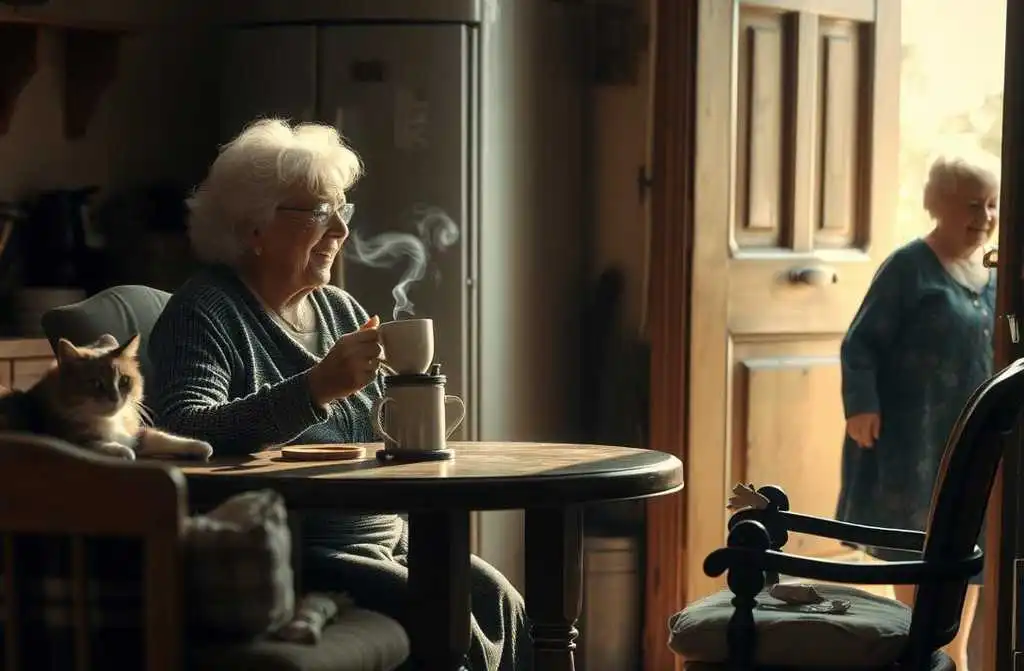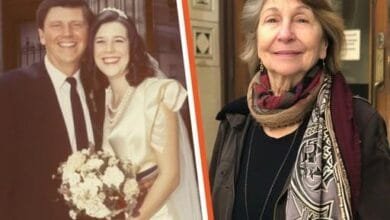The Modest Joy of Coffee in Retirement, After Covering the Essentials.

With her monthly pension, María Antonia managed to pay for the essentials — utilities, bulk groceries — and still allowed herself a small treat: a bag of whole coffee beans.
The beans were already roasted, and just tearing a corner of the package released a rich, captivating aroma. Smelling it was almost ceremonial. She would close her eyes, forget everything else, and focus only on her sense of smell. That’s when the magic happened: the scent filled her body with energy, stirred up old dreams of faraway lands — ocean waves, tropical rain falling on thick foliage, the whispers of the jungle, the wild cries of monkeys swinging from vines…

She had never seen those places herself, but she remembered the stories her father used to tell. He often disappeared on scientific expeditions to South America. When he was home, he’d sip strong coffee and share tales of the Amazon Valley with little Marianita curled up by his side. That smell always brought him back to her mind — a lean, sun-darkened man, full of adventure.
María Antonia had always known her parents weren’t biological. She remembered how, at the beginning of the war, a woman found her — a three-year-old girl who had lost her family — and became her mother for life. After that, her path was ordinary: school, studies, work, marriage, the birth of a son… and eventually, loneliness.
About twenty years ago, her son moved abroad with his wife. They built a life together in Barcelona and only visited their hometown once. He kept in touch by phone and sent her money every month, which María Antonia saved religiously in a separate account. Over the years, she’d built up a considerable amount — money she intended to leave him. And then, after that…
Lately, the thought wouldn’t leave her mind: she had lived a good life, full of love and care — but it hadn’t truly been hers. If the war hadn’t happened, she would have had different parents, a different home, a different destiny. She remembered little about her biological family, but often thought of a girl her age who had always been near during those faded early years. Her name was Carmen. Sometimes she could still hear the voices calling: “Carmencita, Marianita!” Who was she? A friend? A sister?
Her thoughts were interrupted by the soft chime of her phone. She looked at the screen: her pension had been deposited. Perfect timing. She could finally go out and buy some coffee — she had finished the last of it that morning. She walked carefully down the sidewalk, avoiding autumn puddles, and approached the shop entrance.
Near the door, a small gray tabby cat sat watching the people and the glass doors. María Antonia’s heart ached. “Poor little thing… cold and probably hungry. I would take you home, but… who would care for you after I’m gone? I only have… today or maybe tomorrow.” Still moved by the cat, she bought a cheap packet of food.
Carefully, she emptied the gelatinous food into a small plastic container. The cat waited patiently, gazing at her with loving eyes. Suddenly, the shop doors burst open and a large woman stormed out, clearly angry. Without a word, she kicked the dish, sending pieces of food flying across the sidewalk.
— “How many times do I have to say it?” — she shouted. — “You can’t feed animals here!” And off she went in a huff.
The cat, now alert, began collecting the scattered pieces, while María Antonia, suffocating with indignation, felt the first signs of an attack. She rushed to the nearby bus stop, where a few benches stood. Sitting down, she frantically searched her pockets for her medication — but found nothing.
The pain came in waves, pressing into her head like a vice. Her vision darkened, and a moan escaped her lips. Someone touched her shoulder. She opened her eyes slowly and saw a young woman staring at her in alarm:
— “Are you okay, grandma? How can I help you?”
— “In… the bag…” María Antonia whispered, motioning weakly. — “There’s a bag of coffee… open it.”
The girl leaned over, opened the package, and held it to her. María Antonia inhaled the aroma deeply — once, twice. The pain didn’t vanish, but it eased.
— “Thank you, darling…” she murmured.
— “I’m Clara. But thank the cat too,” said the girl with a smile. — “She was sitting right next to you, meowing so loud.”
— “And thank you too, my dear,” said María Antonia, stroking the tabby now sitting beside her on the bench.
— “What happened to you?” Clara asked curiously.
— “An episode… migraine,” María Antonia admitted. — “I got upset. It happens sometimes…”
— “I’ll walk you home. It’ll be hard for you to get back alone.”
— “My great-grandma also suffers from migraines,” Clara explained later, as they sat together sipping coffee with milk and nibbling on cookies in María Antonia’s cozy apartment. — “She lives in a village with my grandmother, mom, and dad. I study here — nursing school — I’m training to become an emergency medical technician. My grandma calls me ‘darling’ too. And you look so much like her… I almost thought you were her. Have you ever tried to find your real family?”
— “How would I, Clarita? I hardly remember anything. Not even my last name, or where I’m from,” María Antonia said, gently stroking the cat curled up on her lap. — “I remember the bombing… the cart we rode in… then the tanks…”
I ran and ran, like I didn’t know who I was anymore. It was terrifying — a trauma that stayed forever. Then a woman found me. I’ve always called her ‘mom’ — and she still is. After the war, her husband returned, and he became the best father I could have asked for. All that remains from before… is my name. My biological family probably died in the bombings. My mother… and Carmencita…
She didn’t notice that Clara had gone still. The young woman stared at her, wide-eyed, stunned.
— “María Antonia… do you have a birthmark on your right shoulder shaped like a leaf?”
María Antonia nearly choked on her coffee. The cat looked at her as if she already knew.
— “How do you know that, sweetheart?”
— “My grandmother has one just like it…” Clara whispered. — “Her name is Carmen. She still cries when she talks about her twin sister, Marianita. She disappeared during a bombing, while they were evacuating. When the fascists blocked the road, they had to turn back and live under occupation. But Marianita never came back. They searched… but she was never found.”
That morning, María Antonia couldn’t find peace. She wandered from the window to the door, anxiously waiting. The little gray tabby never left her side, watching her face with intensity.
— “Don’t worry, Margarita… I’m fine,” she reassured the cat softly. — “It’s just that my heart is beating so fast…”
Finally, the doorbell rang. Nervously, María Antonia went to open it.
Two elderly women stood face to face, frozen in silence, gazing at each other with eyes full of hope. It was like looking into a mirror — the same vibrant blue eyes, silver curls, and soft lines of longing etched into the corners of their mouths.
At last, the visitor smiled, took a step forward, and embraced her tightly:
— “Marianita… my God… it’s really you!”
And there, standing at the doorway, wiping away tears of joy… was her real family.





